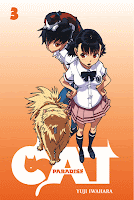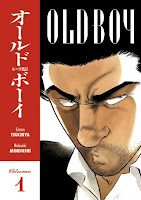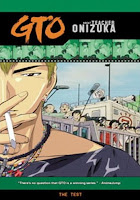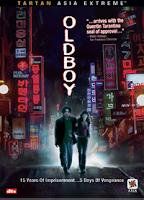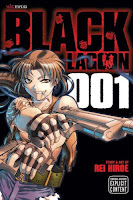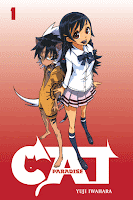My News and Reviews
The Manga Moveable Feast for Karakuri Odette finished up yesterday. I was pleased to contribute not one, but two posts this time around (three if you count my quick take of the entire series). This probably won’t happen very often, but we’ll see what I can do. My first post was an in-depth review of the first volume of Karakuri Odette. This is the second in-depth manga review for January, so I’ve met my goal for another month, hooray! I also took a closer look at the androids of Karakuri Odette to see how they measured up to Isaac Asimov’s Three Laws of Robotics. It’s kind of silly, but I had fun with it.
Did you get a chance to see the live-action Gantz film last week? Or maybe you just heard about it? Or perhaps you have no idea what I’m talking about? Regardless, there’s been an increased interest in the manga series it was based on, so I’ll be giving away a brand new copy of Gantz, Volume 1 by Hiroya Oku. The contest will begin this coming Wednesday, January 26 and will run for a week.
Quick Takes
 ES: Eternal Sabbath, Volumes 1-8 by Fuyumi Soryo. I originally read the first four volumes of Eternal Sabbath from the library, but I liked the series so well that I picked up an entire set for myself. Shuro’s development as a character was particularly interesting. Incredibly intelligent and mature for his age, he is inexperienced emotionally and has to come to grips with this. And he isn’t the only character to grow and change throughout the series. The story itself explores some tough moral questions. The ending was a bit abrupt and parts of it were a little disappointing—Soryo probably could have used a couple more volumes finish—but I still really enjoyed the series.
ES: Eternal Sabbath, Volumes 1-8 by Fuyumi Soryo. I originally read the first four volumes of Eternal Sabbath from the library, but I liked the series so well that I picked up an entire set for myself. Shuro’s development as a character was particularly interesting. Incredibly intelligent and mature for his age, he is inexperienced emotionally and has to come to grips with this. And he isn’t the only character to grow and change throughout the series. The story itself explores some tough moral questions. The ending was a bit abrupt and parts of it were a little disappointing—Soryo probably could have used a couple more volumes finish—but I still really enjoyed the series.
 Gantz, Volumes 1-5 by Hiroya Oku. The artwork is gloriously graphic and slightly disconcerting, but I do like it. However, there is bit more fan-service and misogyny than is necessary, although some of it is appropriate to the story. Gantz is dark. Gantz is violent. Gantz is edgy. It’s hard to say where Oku is going to go with the series and what the aim is or if there is some deeper meaning, but so far the examination of the human psyche is very interesting. The willingness that some characters show to participate in a deadly “game” that they don’t even understand is fascinating. I’ll probably keep with the series for a bit longer; I’d really like to know what is going on and there’s a lot of potential.
Gantz, Volumes 1-5 by Hiroya Oku. The artwork is gloriously graphic and slightly disconcerting, but I do like it. However, there is bit more fan-service and misogyny than is necessary, although some of it is appropriate to the story. Gantz is dark. Gantz is violent. Gantz is edgy. It’s hard to say where Oku is going to go with the series and what the aim is or if there is some deeper meaning, but so far the examination of the human psyche is very interesting. The willingness that some characters show to participate in a deadly “game” that they don’t even understand is fascinating. I’ll probably keep with the series for a bit longer; I’d really like to know what is going on and there’s a lot of potential.
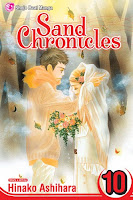 Sand Chronicles, Volume 10 by Hinako Ashihara. This is the final volume of Sand Chronicles which remains one of my favorite shoujo series. The main story ended with the eighth volume; volume ten is a side story that takes place when the main characters are in their thirties. They still struggle to accept and deal with their pasts which is not at all an easy thing. The emotional authenticity of Sand Chronicles has been one of its highlights throughout the series and the final volume is no exception. It provides a very satisfying conclusion (and continuation) to the series. The focus this time is on Daigo and it’s nice to see a bit more of the story from his perspective.
Sand Chronicles, Volume 10 by Hinako Ashihara. This is the final volume of Sand Chronicles which remains one of my favorite shoujo series. The main story ended with the eighth volume; volume ten is a side story that takes place when the main characters are in their thirties. They still struggle to accept and deal with their pasts which is not at all an easy thing. The emotional authenticity of Sand Chronicles has been one of its highlights throughout the series and the final volume is no exception. It provides a very satisfying conclusion (and continuation) to the series. The focus this time is on Daigo and it’s nice to see a bit more of the story from his perspective.
 Under Grand Hotel, Volumes 1-2 by Mika Sadahiro. Incredibly intense, Under Grand Hotel is fiercely passionate and violent. Turn to a random page and you’ll most likely end up in the middle of a sex scene, but I was okay with that. Taking place in an underground prison, the manga is certainly a fantasy but a completely developed one. Sword is the shot-caller at UGH and Sen becomes his cellmate and lover for protection. At first it’s simply a convenient arrangement, but it soon becomes more. It’s not really a romantic love that is fostered, but instead the two men become mutually dependent upon one another and their lives are intertwined to such an extent that they can’t break free.
Under Grand Hotel, Volumes 1-2 by Mika Sadahiro. Incredibly intense, Under Grand Hotel is fiercely passionate and violent. Turn to a random page and you’ll most likely end up in the middle of a sex scene, but I was okay with that. Taking place in an underground prison, the manga is certainly a fantasy but a completely developed one. Sword is the shot-caller at UGH and Sen becomes his cellmate and lover for protection. At first it’s simply a convenient arrangement, but it soon becomes more. It’s not really a romantic love that is fostered, but instead the two men become mutually dependent upon one another and their lives are intertwined to such an extent that they can’t break free.
 Departures directed by Yōjirō Takita. Departures won an Oscar for Best Foreign Language Film in 2009, an honor that is well deserved, among many, many other awards. Daigo lands his dream job as a cellist just before the orchestra is dissolved. (As a fellow “failed” musician, I completely understand what he is going through.) He returns to his hometown and, mostly by chance or fate, becomes the assistant to an encoffiner. It’s a misunderstood a job that isn’t looked well upon, and so he tries to hide it from his wife and is unsure about pursuing it himself. Departures is a beautiful film that faces life and death head on without getting too heavy.
Departures directed by Yōjirō Takita. Departures won an Oscar for Best Foreign Language Film in 2009, an honor that is well deserved, among many, many other awards. Daigo lands his dream job as a cellist just before the orchestra is dissolved. (As a fellow “failed” musician, I completely understand what he is going through.) He returns to his hometown and, mostly by chance or fate, becomes the assistant to an encoffiner. It’s a misunderstood a job that isn’t looked well upon, and so he tries to hide it from his wife and is unsure about pursuing it himself. Departures is a beautiful film that faces life and death head on without getting too heavy.
 Gantz (World Premiere Live Event) directed by Shinsuke Sato. It was really unfortunate that they decided to screen this with an English dub rather than subtitles. Otherwise, the films seem to be a fairly decent adaptation of the manga so far and the visuals are great. The suits in particular are fantastic. However, for as much action and violence that is in the movie, the pacing seems to drag quite a bit. It also seems to be missing some of the intensity and edge present in the manga. I did enjoy Kenji Kawai’s score and the music was just the right mixture of creepy and driving. The actors did a fine job, particularly Kenichi Matsuyama, and I’m interested in seeing the second part of Gantz when it is released latter this year.
Gantz (World Premiere Live Event) directed by Shinsuke Sato. It was really unfortunate that they decided to screen this with an English dub rather than subtitles. Otherwise, the films seem to be a fairly decent adaptation of the manga so far and the visuals are great. The suits in particular are fantastic. However, for as much action and violence that is in the movie, the pacing seems to drag quite a bit. It also seems to be missing some of the intensity and edge present in the manga. I did enjoy Kenji Kawai’s score and the music was just the right mixture of creepy and driving. The actors did a fine job, particularly Kenichi Matsuyama, and I’m interested in seeing the second part of Gantz when it is released latter this year.

